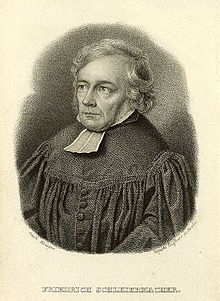Friedrich Daniel Ernst Schleiermacher
| Friedrich Schleiermacher | |
|---|---|
 |
|
| Born |
November 21, 1768 Breslau, Silesia, Prussia |
| Died | February 12, 1834 (aged 65) Berlin, Brandenburg, Prussia |
| Alma mater | University of Halle (1787–90) |
| Era | 18th/19th-century philosophy |
| Region | Western Philosophy |
| School |
German Idealism Jena Romanticism Berlin Romanticism Romantic hermeneutics Methodological hermeneutics |
| Institutions |
University of Halle (1804–07) University of Berlin (1810–1834) |
|
Main interests
|
Theology, psychology, New Testament exegesis, ethics (both philosophic and Christian), dogmatic and practical theology, dialectics (logic and metaphysics), politics |
|
Notable ideas
|
Hermeneutics as a cyclical process |
Friedrich Daniel Ernst Schleiermacher (German: [ˈʃlaɪɐˌmaχɐ]; November 21, 1768 – February 12, 1834) was a German theologian, philosopher, and biblical scholar known for his attempt to reconcile the criticisms of the Enlightenment with traditional Protestant Christianity. He also became influential in the evolution of Higher Criticism, and his work forms part of the foundation of the modern field of hermeneutics. Because of his profound effect on subsequent Christian thought, he is often called the "Father of Modern Liberal Theology" and is considered an early leader in liberal Christianity. The Neo-Orthodoxy movement of the twentieth century, typically (though not without challenge) seen to be spearheaded by Karl Barth, was in many ways an attempt to challenge his influence.
Born in Breslau in the Prussian Silesia as the grandson of Daniel Schleiermacher, a pastor at one time associated with the Zionites, and the son of Gottlieb Schleiermacher, a Reformed Church chaplain in the Prussian army, Schleiermacher started his formal education in a Moravian school at Niesky in Upper Lusatia, and at Barby near Magdeburg. However, pietistic Moravian theology failed to satisfy his increasing doubts, and his father reluctantly gave him permission to enter the University of Halle, which had already abandoned pietism and adopted the rationalist spirit of Christian Wolff and Johann Salomo Semler. As a theology student Schleiermacher pursued an independent course of reading and neglected the study of the Old Testament and of Oriental languages. However, he did attend the lectures of Semler, where he became acquainted with the techniques of historical criticism of the New Testament, and of Johann Augustus Eberhard, from whom he acquired a love of the philosophy of Plato and Aristotle. At the same time he studied the writings of Immanuel Kant and Friedrich Heinrich Jacobi, and began to apply ideas from the Greek philosophers to a reconstruction of Kant's system.
...
Wikipedia
